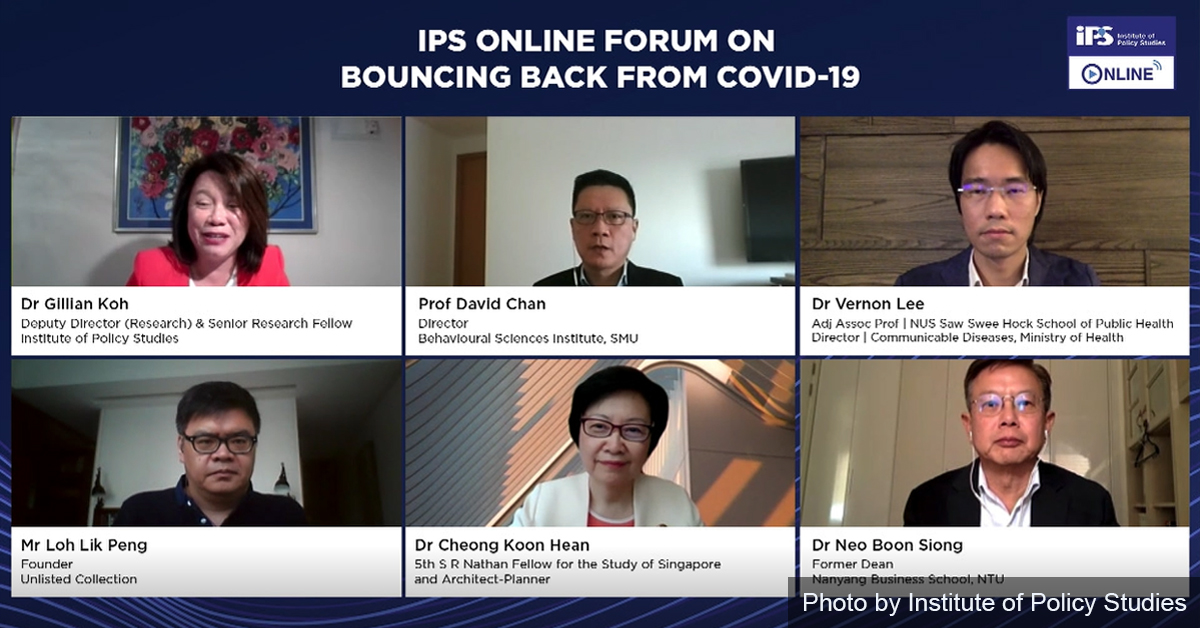
The fourth IPS Online series titled Bouncing Back from COVID-19 was held on June 3, a day after Singapore partially lifted its circuit breaker measures. Moderated by Dr Gillian Koh, Deputy Director (Research) and Senior Research Fellow at the Institute of Policy Studies, the 90-minute forum, which saw active participation in the form of questions from Facebook audiences, discussed how citizens, and the public and private sectors, could contribute to Singapore bouncing back from the virus quickly and smoothly.
All panelists agreed that COVID-19 has changed how Singaporeans live, work and play. But riding out the virus and emerging stronger at the end will require both hard skills that inspire tech-driven innovation, as well as soft skills such as agile and dynamic leadership.
With no vaccine in the near horizon, Singaporeans would first have to adapt and learn how to co-exist with the virus, said Dr Vernon Lee, Adjunct Associate Professor at the Saw Swee Hock School of Public Health, National University of Singapore, and Director of Communicable Diseases at the Ministry of Health.
The hospitality and F&B sectors were among the first to do so, with restaurants quickly changing their business models to prioritise delivery and takeout for the short-term, said Mr Loh Lik Peng, founder and owner of the Unlisted Collection of hotels and restaurants. They are also already looking at long-term measures. These include segregating kitchens to limit interactions between cook staff and those front-of-house. He added that hotels were also adapting to the virus by testing RFID door-locks and automatic check-ins to limit interactions in high-touch areas.
Professor David Chan, Director of the Behavioural Sciences Institute at Singapore Management University, said even as the country opens up, things will not go back to what they were before. Dr Neo Boon Siong, Former Dean of Nanyang Business School, Nanyang Technological University, agreed. He added that Singaporeans cannot expect absolute clarity from the Government, given the evolving situation. So there is a need to act fast and frequently, but without losing sight of safety and survival.
As Singaporeans bounce back, new ways of living, leading and collaboration must emerge.
New ways of living
As the health crisis places importance on social distancing, urban planners will need to consider ways to manage population density. Work has already started, said Dr Cheong Koon Hean, IPS’ 5th S R Nathan Fellow for the Study of Singapore and Architect-Planner, who mentioned building self-sufficient neighbourhoods where jobs and amenities are closer to homes, thus reducing congestion in the city centre and commercial hubs. In the event of a pandemic, these neighbourhoods can become bubbles that can be contained and isolated.
Dr Cheong also highlighted areas of improvement for work, living and communal spaces. Office buildings could include contactless systems such as door handles and water taps that are triggered by sensors; living spaces could be redesigned to ensure more privacy in homes given the rise in telecommuting; and communal accommodation such as dorms, nursing homes and school hostels would have to be spread out with more segregated areas.
She also advocated the use of innovative technology – geospatial tools, robotics and automation solutions, for example – to enable close but safe living, post-pandemic. For example, technology could help with real-time seat management on public transport.
There was a deeper discussion on what it means to de-densify the city, and whether such plans could sit with Singapore’s controversial projection of a 6.9 million population by 2030.
Population density does not necessarily affect the spread of the virus, said Dr Lee. He added that Singapore’s population density has not changed since the outbreak of the virus. What has contained its spread are the circuit breaker measures implemented by the Government. He also noted some cities and countries with more sparsely distributed populations still had high level of transmissions. Density is not the problem but the congregation of people.
New ways of leading
Dr Neo said the health crisis has also emphasised the importance of agile leadership, citing how political leaders have adapted quickly to dynamic decision-making in order to better respond to the crisis.
He hoped this leadership style would continue and also urged citizens to judge the Government based on their overall achievements and portfolio, not on responses to singular issues such as the spread of COVID-19 in the dormitories. Professor Chan agreed, and said while citizens are not expecting perfection from their political leaders, leaders should also acknowledge and learn from their mistakes.
New ways of collaboration
So far, the crisis has also shown that Singaporeans will come together and rally for a cause, said Dr Neo, who mentioned community efforts to care for COVID-19 patients. Moving forward, all panellists hoped that citizens would continue to look out for one another, and work together as a united community.
Mr Loh said the business community has also been heartened by the Government’s efforts to consult and engage, as well as the robustness of their policies.
Ultimately, overcoming the effects of the coronavirus will require a whole-of-nation approach. Dr Lee reiterated that the goal is for citizens to emerge from the pandemic safe and healthy. And in order to achieve that, government, businesses and citizens have to work together, adopt safe measures and be socially responsible.
